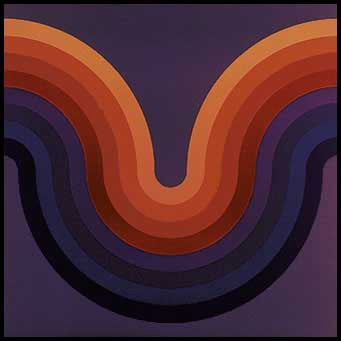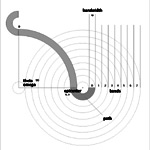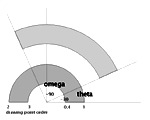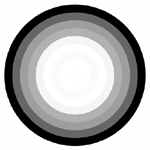 |
The Panton Kurve is a computational construction of a geometric textile
named Kurve, originally created by Verner Panton, 1960.
There is no user interaction.
|
 |
| |

Kurve,
Verner Panton, 1960.
|
|
| |
The Panton Kurve is created
by drawing concentric paths around a continually offset epicenter.
In this particular example, the Kurve is composed of eight paths
of 18 pixels each.
|
 |

figure a.
geometric deconstruction of the Verner Kurve |
|
|
| |

figure b.
the Kurve design can be broken into smaller path objects. |
 |
To accurately construct the
Kurve while leaving room for later experimentation, the design
was broken into small, easily definable pieces. Primarily, this
includes the path. The path is an arc of variable radius, width,
and color drawn with Flash MX's drawing API. Refer to the diagram
at left for details.
|
|
|
| |
The colors of the Panton Kurve were taken from photographs of the
original textile pattern. The background was also kept consistent.
At the time, Panton's approach to color was considered uncompromising
and bold.
|
|
| |
| We might construct something
a little more irregular than the original Kurve if we choose
not to restrict the path increments to 90 degrees. Instead,
we will allow rotations from as small as 30 degrees to as large
as 330 degrees. |
 |

Figure c.
implementation details using arbitrary angles for the path objects |
|
|
| |
The Kurve and variations thereof, became a ubiquitous component in
Verner Panton's work. I believe the success of this geometric design
is owed to its harmonious ability to flow from one focal point to
another. By most observers, the Panton Kurve is unconsciously regarded
as good.
View another Panton inspired computation, Geometri'
I. |
|
| |
|
|
| |
|
|
| |
jtarbell,
february 2003 |
|







